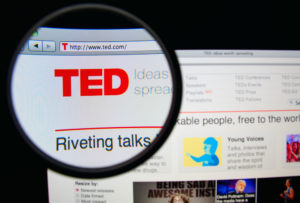Most everyone knows what TED Talks are. The talks are so popular that many cities, including colleges and universities, host their own TED conferences and education talks.
TED Talks range from inspiring to humorous and cautionary, but there’s something we can learn from each speaker’s experience.
In this article, we’ve gathered a handful of TED Talks with higher-ed relevance. From smart computers to what’s next for the U.S. economy and fostering healthy campus debate, the TED Talks offer a variety of widsom. Some are a couple years old, and others are brand new, but they all have one thing in common: they’ll get you thinking about higher education’s place in society, its future, and what learning truly means.
(Next page: The Future of Higher Education, and 5 more TED Talks)
1. The Future of Higher Education
The future of higher education will be dominated by distance learning and at the heart of this process will be the cell phone. This will permit higher education to be offered in a cost effective manner throughout the world. Recorded at TEDxBaltimore January 2016.
2. 4 pillars of college success in science
At age 12, Freeman Hrabowski marched with Martin Luther King. Now he’s president of the University of Maryland, Baltimore County (UMBC), where he works to create an environment that helps under-represented students — specifically African-American, Latino and low-income learners—get degrees in math and science. He shares the four pillars of UMBC’s approach.
3. Dare to disagree
Most people instinctively avoid conflict, but as Margaret Heffernan shows us, good disagreement is central to progress. She illustrates (sometimes counter-intuitively) how the best partners aren’t echo chambers — and how great research teams, relationships and businesses allow people to deeply disagree.
4. How computers are learning to be creative
We’re on the edge of a new frontier in art and creativity — and it’s not human. Blaise Agüera y Arcas, principal scientist at Google, works with deep neural networks for machine perception and distributed learning. In this captivating demo, he shows how neural nets trained to recognize images can be run in reverse, to generate them. The results: spectacular, hallucinatory collages (and poems!) that defy categorization. “Perception and creativity are very intimately connected,” Agüera y Arcas says. “Any creature, any being that is able to do perceptual acts is also able to create.”
5. Designing a university for the new millennium
Following 35 years on the faculty of Columbia University in New York, more than half of that time as Chair of the Department of Astronomy and Astrophysics, Dr. Helfand developed a deep understanding of the problems of traditional universities. Seizing an opportunity to redesign higher education from scratch, he has served as a Founding Tutor and, since 2008, as President and Vice Chancellor of Quest University Canada. He is also President of the American Astronomical Society, the professional society for astronomers, astrophysicists, planetary scientists and solar physicists in North America.
6. The death of innovation, the end of growth
The US economy has been expanding wildly for two centuries. Are we witnessing the end of growth? Economist Robert Gordon lays out 4 reasons US growth may be slowing, detailing factors like epidemic debt and growing inequality, which could move the US into a period of stasis we can’t innovate our way out of. Be sure to watch the opposing viewpoint from Erik Brynjolfsson.
- Are AI skills more important than degrees? - May 2, 2024
- Report forecasts a ‘surge’ in GenAI adoption - April 26, 2024
- Where are microcredentials today–and where are they going? - April 22, 2024

